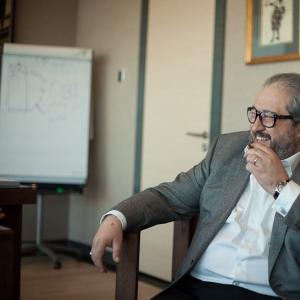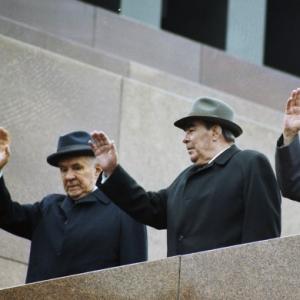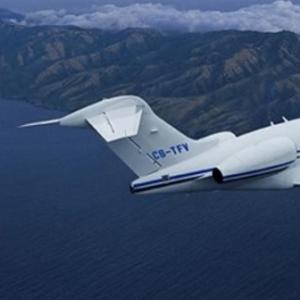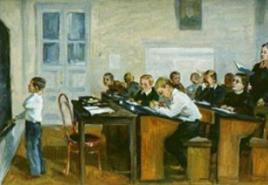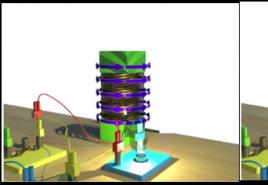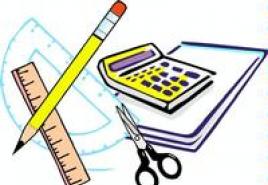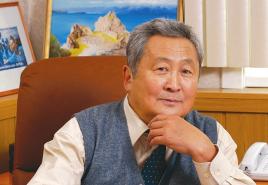Rating of Russia's gray cardinals: who runs the country? The gray cardinal of the Kremlin The black cardinal of the Kremlin.
Some call him “the Russian Machiavelli,” “the Kremlin’s puppeteer,” or even “Putin’s Rasputin.” However, everyone agrees that Vladislav Surkov is the most influential adviser on the Russian political scene.
At 47 years old, this lover of jazz, rap and surreal painting is the main ideologist of the authorities. “A brilliant, cynical manipulator, he is indispensable to the current system. The fact that Putin has been at the top of power for eleven years is a great merit of the intelligent and absolutely unscrupulous Slava,” Carnegie Center analyst Masha Lipman told the magazine.
Now his task is to ensure that the decisions taken in the Kremlin are passed in Parliament “without a hitch.” After all, everyone knows perfectly well that the Duma does not decide anything. Slava’s task is to hold the presidential elections on March 4, 2012 as realistically as possible.
Everything should go according to the already written script: Vladimir Putin should triumphantly return to the presidential chair, which he had to vacate in 2008, since the constitution prohibits running for a third presidential term, the authors of the article remind.
So who is he, this “Kremlin puppeteer”? First of all, Surkov is a theorist. We owe to him the concept of “sovereign democracy,” a euphemism that defines the current autocratic system in Russia.
“Our democracy is like a stage set,” says Boris Nadezhdin, one of the leaders of the liberal Right Cause party, which is not represented in the Duma. It's no secret that Russian pluralism is a fiction, that the seven permitted parties are, in essence, controlled by the Kremlin. They must regularly report to Surkov.
The “Kremlin puppeteer” does not ignore the communists. “Now Surkov is strengthening the opposition role of the communists to the current government. Today Zyuganov is held in high esteem,” the magazine quotes former KGB general and now oppositionist Alexei Kondaurov.
Nationalist leader Vladimir Zhirinovsky enjoys no less attention. Those who refuse to cooperate, like Boris Nemtsov, for example, remain left out. These parties are denied registration, and, in fact, their existence.
Slava is omnipotent, he has unlimited power, he can create a political force “out of nothing” and then, as unnecessary, destroy it. The most obvious example of this is the Pensioners Party, created a few months before the 2003 parliamentary elections. Who remembers her now?
Another example. In the spring, the Kremlin, to please pro-European-minded liberals, “squandered” the liberal “Right Cause”. Oligarch Mikhail Prokhorov was called into leadership. However, “Just Cause” could not get into the Duma: the billionaire not only does not account for his actions to Surkov, he gathered around himself open ill-wishers of Putin.
Exactly five months later, Prokhorov was removed. “There is a puppeteer in this country who has privatized the political system and is deceiving our leaders. His name is Vladislav Yuryevich Surkov,” said an offended Prokhorov in front of television cameras, who nevertheless decided to stand as a candidate in the elections on March 4, 2012.
Surkov was probably offended. And he was right. After all, for him, real democracy does not exist at all. “The most important thing for him is to influence people and maintain the illusion of freedom. For him, the only freedom is art,” comments Professor from Kent Richard Sakwa in the weekly.
Hence his love for the poetry of the beatnik king Alain Ginsberg, for gothic rock (he writes songs for the Russian group Agatha Christie). On the wall of his office, next to a photograph of American rapper Tupac Shakur, hang photos of Einstein and Che Guevara.
Slava loves art. His last publication was in the magazine “Art Khronika” about Joan Miro. Surkov is also a writer. His most significant work remains the novel Near Zero.
So who is Vladislav Surkov? Good question. Slava is not like anyone else: neither a former KGB officer, nor a native of St. Petersburg, like the majority of the “Putin clan.” Surkov's father is Chechen. This touch in the biography of the “Kremlin puppeteer” was kept secret for a long time.
In 2005, after he abandoned his political ambitions, Slava's origins were declassified. It is clear that with such a stain on his biography, Surkov would never have been able to occupy a leadership position.
There is one more touch to Surkov’s biography. Or rather, it’s a curiosity. Vladislav Yuryevich began his career with Khodorkovsky. From 1991 to 1996, he held senior positions in the Menatep Association of Credit and Financial Enterprises, which was headed by Mikhail Khodorkovsky.
Then the Menatep Bank logo adorned buses, trams, and city walls. In the late 1990s, Surkov served as director of the public relations department of Alfa Bank and the ORT television channel.
In 1999, Vladislav Surkov was appointed assistant to the head of the Russian Presidential Administration. Slava officially still holds this position. So, Vladislav Surkov served first Putin, now Medvedev, and after the presidential elections in the spring of 2012, he will again serve Putin, whom he considers “sent to Russia by God.”
Vladislav Surkov probably compares himself with Konstantin Pobedonostsev, who was an adviser to three tsars - Alexander the Second, Alexander the Third and Nicholas the Second, and for whom the European power structures of Russia were not suitable.
Or with the Siberian peasant Grigory Rasputin, this adventurer-mystic who had an incredible influence on the last Russian emperor, thanks to his talent as a “seer and healer.” (The heir was sick with leukemia.)
Or maybe he compares himself to the Communist Party ideologist Mikhail Suslov, one of the most influential figures of the Soviet era? In any case, Vladislav Surkov can be pleased with himself, say the authors of the article in Express, Alex Gilden and Alla Shevelkina.
Vladislav Surkov secretly serves as the special representative of the Russian president in Ukraine, two sources close to the Kremlin told Gazeta.Ru. He is assigned the authority to negotiate with the Ukrainian establishment and the right to enter into informal agreements.
Recently, the official has been to Kyiv at least twice - at the end of January and last Friday, February 14. Both times he was received by Viktor Yanukovych.
The information that he will also oversee the Ukrainian direction as an assistant to the president for interaction with Abkhazia and South Ossetia appeared immediately after the return of the former “gray eminence” of domestic politics to the Kremlin. However, high-ranking Kremlin officials, both in informal conversations and publicly, categorically denied information about Surkov’s “Ukrainian mission”.
At the end of December, the situation changed: the information that Vladislav Yuryevich was still working “on the Ukrainian front” became almost universally known in Kremlin and near-Kremlin circles. However, Gazeta.Ru’s sources either refused to say or found it difficult to say exactly what tasks were assigned to the presidential assistant.
The publication’s interlocutor, familiar with the situation, told Gazeta.Ru at the end of last year that there could be an “official constitution” of Surkov as an official in charge of not only the Abkhaz and South Ossetian, but also the Ukrainian direction. In other words, Surkov’s “Kiev activities” would be “formalized” officially. At the same time, the source emphasized that it is too early to “constitute” an official - we must wait until the situation in Ukraine becomes calmer. But the situation not only did not calm down. A civil war began in the country.
Perhaps this is precisely related to the fact that
Surkov’s activities on the “Kiev front” are still classified. While Russian news agencies report from time to time about the official’s trips to Abkhazia and South Ossetia, there is complete silence about his visits to Kyiv.
Meanwhile, as Gazeta.Ru found out, Surkov has recently visited Ukraine at least twice. And both times I met with. The first meeting took place at the end of January, the second on February 14.
“I personally saw Surkov in Kyiv a few days ago,” famous TV journalist Evgeny Kiselev, who has been living in Ukraine for several years, confirmed to Gazeta.Ru. - He met with high-ranking officials. Surkov told me that he travels here often and a lot.”
Surkov is secretly fulfilling the mission of the President’s special representative in Ukraine, a source close to the Kremlin told Gazeta.Ru:
“He can negotiate and enter into informal agreements. This is actually an ambassador. Zurabov (the current Russian ambassador to Ukraine - Gazeta.Ru) is like a soap bubble.”
Vladislav Surkov indeed received a mandate from Putin to interact with representatives of the Ukrainian leadership and local elites on a wide range of issues, confirms another interlocutor of the publication close to the administration of the Russian president. In his opinion,
Regardless of how the events in Ukraine end, Surkov’s mission will remain the same. The two states have too close political and economic ties that cannot be broken in the event of a change of power in Ukraine.
According to Gazeta.Ru, during a secret visit to Ukraine on February 14, Surkov also communicated with at least one government official - Deputy Prime Minister Alexander Vilkul. Previously, the Ukrainian press called him one of the candidates for the post of head of the Cabinet. A source familiar with the situation claims that at the meeting with Vilkul, exclusively economic issues were discussed, namely the project for the construction of a transport crossing across the Kerch Strait.
On the same day, February 14, Surkov visited Crimea. Information about this visit was later leaked to the Ukrainian press and was eventually confirmed by the press service of the Council of Ministers of the autonomy. According to the press service, at a meeting with the head of the Council of Ministers, Anatoly Mogilev, the Russian official also discussed issues related to the construction of the crossing through the Kerch Strait.
“Surkov oversees socio-economic relations with all CIS countries, Abkhazia and South Ossetia (the corresponding department is subordinate to the presidential assistant, headed by Oleg Govorun - Gazeta.Ru). And Ukraine is no exception,” emphasizes one of Gazeta.Ru’s sources.
According to him, the two main areas that the presidential assistant is “in charge of” are issues “related to the economic interaction of border Russian-Ukrainian territories” and the aforementioned project for the construction of a crossing through the Kerch Strait.
Gazeta.Ru asked the press secretary to comment on the information about Surkov’s press secretary’s secret “special representative” and economic tasks in Ukraine. “I can’t confirm,” he said.
Vice-president of the Ukrainian bureau of the Center for Political Technologies Georgy Chizhov emphasizes that when Surkov was appointed assistant to the president, the situation in Kyiv was fundamentally different than it is now. “It’s unlikely that Surkov managed to do anything,” the expert believes. The effect of his activities in the future can be, according to Chizhov, only in one case: if the official “formulates Russia’s position in relation to Ukraine.” “Until recently, statements by officials boiled down to the fact that Ukraine is not quite a state, but in some sense a part of Russia. But such a position is not constructive. In the future, it will lead to Kyiv leaving Moscow’s orbit of influence,” Chizhov believes. Therefore, the expert continues, a different position should be formulated: Ukraine is Russia’s partner.
CHIEF FOR THE POOR AND HUNGRY
ON THIS TOPIC
Mikhail Suslov was born in the Saratov province in 1902. His childhood and youth passed during the reign of the last Russian autocrat, Nicholas II. The parents of the future party leader were ordinary peasants, and the life of this class in those days was difficult, poor and not always well-fed.
The revolution that broke out in 17 and the overthrow of the monarchy had a huge impact on the teenager: in 1918, Misha Suslov joined the ranks of the rural Committee of the Poor. Together with his classmates, he took bread from the rich and gave it to the poor - this was precisely the task assigned to committees specially organized in the young country of the Soviets under the conditions of war communism.
Historians consider the activities of these organizations to be very controversial. On the one hand, the Poor People's Committees tried to prevent starvation among the poorest layer of the population, on the other, their crude and often brutal style of work caused massive protests among peasants throughout the country.
COMMUNIST FROM MARX
The party career of Comrade Suslov is surprising: it seems that the party had just been formed, and Mikhail Andreevich climbed its ladder with breathtaking speed. In 1920, Suslov joined the Komsomol, and in 1921 - the party. Three years later, he already studied at the Plekhanov Moscow Institute of National Economy, and in 1929 he entered graduate school at the Institute of Economics of the Communist Academy.
In the early 30s, the young communist served in the apparatus of the Central Control Commission of the All-Union Communist Party of Bolsheviks and in the Commission of Soviet Control under the Council of People's Commissars. At the same time, Suslov continues to study, as Lenin bequeathed. He carefully studies the works of the leaders of the world proletariat at the Economic Institute of the Red Professorship. During the Great Patriotic War, the party entrusted its son with the organization of the partisan movement in the fascist-occupied Stavropol region.

And after the war, Suslov found himself in the highest echelons of power, and this happened not without his comprehensive knowledge of the works of the classics of Marxism-Leninism. Reading their works, he compiled a huge card index of the authors' statements on economic issues. And one day Stalin urgently needed a quote from Lenin on some very specific economic issue.
The leader's secretary Lev Mehlis remembered Suslov, with whom he studied at the Institute of Red Professors. Mikhail Andreevich quickly found a suitable statement from Lenin in his file cabinet. Such efficiency impressed Stalin, and from that moment the rise of Mikhail Suslov began.

35 YEARS OF SOLITUDE
From 1947 to 1982, Mikhail Suslov served as Secretary of the CPSU Central Committee. He spent almost 35 years in a post that, in fact, is not the highest in the state, but during this time, on the initiative of Suslov, global changes took place in the USSR.
First of all, they concerned party work and discipline. Suslov adhered to orthodox Marxist views, trying to maintain stability without resorting to extremes, but persistently suppressed ideological opponents.
After the exposure of the cult of personality at the 20th Party Congress, Stalin’s name was practically not mentioned in the USSR. And it was Suslov who approved this unspoken rule. The leader of all nations was allowed to be remembered exclusively in military memoirs and films of high artistic value. It is clear that this value was determined in the Kremlin and Suslov was one of the main censors and editors.

Contemporaries claim that during his years in power, Suslov actually led youth and public organizations, the Ministry of Culture, the State Committee for Publishing, Printing and Book Trade, the State Committee for Cinematography, the State Television and Radio, the press, censorship, and relations of the CPSU with foreign communist parties.
I can’t count how many theatrical productions, films and books about communists, their exploits and everyday work appeared in these years! Suslov himself, by the way, considered it his merit to introduce in all universities of the country a subject that drove some students to the point of darkness - scientific communism.
Life Magazine:
Mikhail Suslov is a true Soviet Aryan. The character is Nordic, persistent. In his personal life he is ascetic. Merciless towards the enemies of the USSR.
With such a humorous assessment by journalists of a popular American publication, Suslov was extremely popular in the Soviet Union. Historians found in the archives a protocol of interrogation of junior lieutenant Viktor Ilyin, who attempted to assassinate then Secretary General Leonid Brezhnev in 1969. The military man was personally interrogated by KGB Chairman Yuri Andropov. When asked who he sees in the place of General Secretary of the CPSU Central Committee, Ilyin replied: “At the moment, people consider Suslov the most outstanding person in the party.”

CARDINAL WITHOUT ROLE AND THRONE
Despite his high position and the privileges accorded to the party nomenklatura, in his personal life and everyday life Suslov was more than modest, even ascetic. In this, Suslov was somewhat similar to Stalin. His indifference to material wealth became the talk of the town among high-ranking party and Soviet officials.
Mikhail Suslov wore the same coat for several years and wore galoshes in the old fashioned way. Entering the Central Committee building on Old Square, you could immediately find out whether he was at work or not. If there are galoshes neatly standing under the hanger in the wardrobe, then Suslov is in his office.
The Secretary of the CPSU Central Committee was punctual to the point of pedantry. He came to work at 8:59 a.m. and left at 5:59 p.m. After trips abroad, he handed over the remaining currency to the party cash desk. Suslov did not have a luxurious dacha (but given his rank, he could have), did not host rich receptions and did not encourage nepotism among his colleagues. The country's main ideologist did not accept offerings and clearly distinguished between personal and state property.

Now it is difficult to judge whether such a lifestyle was just a demonstration of closeness to the people or coming from the heart. Stories about the party’s notorious gold are still, no, no, still popping up in the press. Probably, Mikhail Suslov took his most terrible secrets with him to the grave.
He died quietly at the age of 79, shortly before his death he felt unwell and had pain in his arm. Doctors diagnosed heart problems, but Suslov did not believe them, saying that his tendons simply hurt. On January 25, 1982, his heart stopped.
Suslov was buried at the Kremlin wall with such honors that the country had not seen since the death of Stalin. The mid-80s was popularly called the era or five-year period of magnificent funerals: three general secretaries passed away at once - Leonid Brezhnev, Yuri Andropov and Konstantin Chernenko, as well as iconic and influential party figures - Politburo members Kosygin, Pelshe, Ustinov and Rashidov. Among this glorious cohort of deceased communists was the Kremlin’s eminence grise, Mikhail Andreevich Suslov.
Vladislav Surkov, best known as the architect of Putin's system of government and with a reputation as an uncannily skilled political operative, has just “retired” from his cabinet position. It's worth noting here, so that no one gets the false impression that this kind of "resignation" happens when a congressman is caught at a hotel that pays by the hour with a mountain of cocaine and a stripper. So let’s call a spade a spade - Surkov was laid off, fired, retired, cleaned out, thrown out into the cold, given a wolf ticket, and so on, you can use any expression that means “removed from his position not of his own free will.” The long era of the gray eminence in the Kremlin, the beginning of which coincides with the very first days of Putin's rule, appears to be coming to an end.
On the one hand, it is difficult to sympathize with Surkov, or to “mourn” his departure from the Russian political scene*. This man sat in the middle of an incredibly tangled web of corruption, manipulation, lies and dirt, and he is personally responsible for the emergence of many, sometimes quite unpleasant forms of “Putinism” and methods of dealing with his political opponents. In particular, Surkov was one of the authors of the concept of “sovereign democracy” - this term has been used relatively rarely lately, but it is the one that most accurately describes the standard ideological position of the Kremlin and the system at the top of which Putin sits.
For those unfamiliar with the term, “sovereign democracy” is a surprisingly flexible construct that encompasses both everything and nothing. It does not take a single definitive position on what are considered political issues in the West (such as taxes or immigration), and its apologists can be found across the length of the ideological spectrum from left to right. In fact, the only formalized component of “sovereign democracy”, literally the only position on which supporters of the concept do not have any disputes, is the complete denial of any external interference in the internal affairs of the state. That is, in other words, the essence of “sovereign democracy” is that Russia, in fact, is sovereign, and the West does not have the right to dictate terms to it in any form or formulation. Everything else is just a matter of taste. “Sovereign democrats” can be “Russian” nationalists or “Russian” supporters of the policy of maximum involvement of all peoples in government, market liberals or dirigists, anti-clericals or Orthodox chauvinists, hawks or doves, siloviki or “civilians”, and in general can sit on both sides of absolutely every political furrow imaginable. But they are all members of a single Kremlin team and unanimously believe that Russia is a great and strong country, whose choice everyone else must respect.
As the founder of a meaningless ideology of power and a politician so ruthless and dark that in comparison with him James Carville (James Carville, a famous American political consultant and commentator - note InoSMI) is simply the head of a boy scout troop, Surkov hardly deserves sympathy. However, his departure is definitely bad news. Why?
Firstly, Surkov, despite all his shortcomings, never favored either repression or bloodshed. He understood perfectly well that the Kremlin needed to split and weaken any opposition, but he preferred to achieve this by methods that did not include arresting and imprisoning random people. Instead, he created political parties like A Just Russia, which were supposed to attract the opposition electorate while maintaining loyalty to the Kremlin. Depending on momentary ideological needs, these parties could find themselves in favor or fall out of favor. Polls show leftist economic sentiment on the rise? Let's throw a couple of bones to the "left" opposition and vaguely promise to give everyone money. Do polls show rising nationalism? It’s wonderful, let Zhirinovsky and the LDPR appear on TV once again.
When dealing with high-ranking dissidents, Surkov was just as subtle and preferred to do without direct violence. In his life he would never have staged such a clumsy trial, because the harsh conditions in the courtroom can lead to too unpredictable consequences. He released secretly recorded recordings of people having sex, eavesdropped phone conversations, data from hacked bank accounts, real estate records, mortgage applications, emails, text messages - basically any personal information that could be found about a particular person. person. After all, dig deeper into anyone and you will find something delicate or unpleasant. And as if reality in itself were not repulsive enough (and it often was), Surkov and his charges simply made up scandals - in the spirit of “paying someone to say that such and such an opposition activist is a bitter drunkard, beats wife and generally a thief.” What was important was not the reality itself, but the impression made, and Surkov was an unsurpassed master of smearing political opponents in the mud so that at least something stuck.
But Surkov acted subtly. His methods are to buy a person or say nasty things behind his back, but in no way beat him with a police baton. In this, Surkov radically differs from his "successor" as the curator of the opposition - Alexander Bastrykin, head of the Investigative Committee and a man who is clearly delighted with the "club" method. The Putin system has not changed in many ways over the years, but the difference in approaches between Surkov and Bastrykin is simply amazing. Surkov worked like an Olympic-class fencer, constantly throwing feints, dodging and parrying, never making too aggressive moves in one direction, constantly on guard. Bastrykin is a T-90 tank, slow, predictable and destructive. You always know where he's going and who he's going to run over.
Considering how many difficulties Russia will have to face simultaneously in 2013, such a "tanker" approach is the last thing it needs. So Surkov is a rather unsympathetic figure, but those who cursed him before will surely miss him soon.
* Surkov is often compared to Rasputin, and if we remember how much effort the conspirators had to expend in order to finally finish off the crazy old priest, I would like to make a cautious assumption: it is possible, although the further it goes, the less likely it is that Surkov will get out of it this time and stay in Game.
Presidential Assistant Vladislav Surkov, who is responsible for Ukraine and Abkhazia, may leave his post and leave Old Square
RBC sources cite various reasons for Surkov’s possible resignation. The strategy in the Ukrainian direction as a whole has reached a dead end, the Minsk agreements are not being implemented, and no breakthroughs are expected, said interlocutors close to the CIS administration. “The problems with the DPR and LPR cannot be resolved in our lifetime; this is a matter for the next generations,” added a source close to the Kremlin. It’s not about Surkov - no matter who you put in this direction, the results will be approximately the same, noted another RBC interlocutor close to the presidential administration.
Surkov had conflicts with other departments, which “believed that he was interfering in matters other than his own,” one of RBC’s interlocutors close to the Kremlin gave another reason for the official’s possible departure.
According to two RBC sources close to the CIS department, Surkov’s team had a conflict with the security forces, in particular with the 5th FSB service (service of operational information and international relations), which was responsible for counterintelligence in the territories of the DPR and LPR. It was this service, RBC sources claim, that supported the head of the LPR MGB Leonid Pasechnik in his conflict with the head of the self-proclaimed republic Igor Plotnitsky. The head of the LPR, in turn, was supported by Surkov, RBC sources previously said.
In turn, a source in the Kremlin told RBC that Surkov, on the contrary, had a conflict with Plotnitsky and the official sought the resignation of the head of the LPR.
Surkov himself is ready to leave his post; this has nothing to do with the state of Russian-Ukrainian relations, says another RBC source close to the presidential administration.
According to Alexei Chesnakov, director of the Center for Current Political Affairs, who is close to Surkov, the presidential aide most likely will not remain in the Kremlin. “I don’t know how and when the decision will be made, but I have a feeling that Vladislav Yuryevich is unlikely to remain working in his current capacity,” said the political scientist. - He is an outstanding political strategist. But it’s too early to draw conclusions about how his possible departure could affect the Minsk processes and the fate of Ukraine.”
“I treat rumors with a certain degree of irony,” Denis Pushilin, plenipotentiary representative of the self-proclaimed Donetsk People’s Republic (DPR) in the contact group, told RBC in response to a question about Surkov’s possible departure. “We have Minsk planned next week. All according to plan. We are working,” added the DPR representative.
According to one of RBC’s sources, earlier the head of one of the departments, Inal Ardzinba, who was also in charge of the Ukrainian direction, resigned from the department for socio-economic cooperation with the CIS countries, Abkhazia and South Ossetia. The head of the Security Service of Ukraine, Vasily Gritsak, called Ardzinba the curator of the “Bessarabian People’s Republic” in the Odessa region.
The fate of the agreements
With the mediation of Surkov, the first (2014) and second (2015) Minsk agreements were concluded, providing for a ceasefire on the territory of the Donetsk and Lugansk regions of Ukraine. The documents contain an action plan to end the conflict in Donbass and return the region to Kyiv's control in exchange for broad autonomy. However, in reality, over the three years of the existence of the signed agreement, most of its provisions have not been implemented, despite the decrease in the intensity of hostilities.

Presidential aide Vladislav Surkov may leave his post
Oleg Ignatov, deputy director of the Center for Current Politics, sees three possible scenarios for the continuation of the Minsk process. The first, highly unlikely, is that Ukraine will comply with all the terms of the agreements. The second, no more realistic, option involves concessions on the part of Russia, which will come to the conclusion that Ukraine cannot fulfill all obligations or fulfill them in the way Moscow wants.
The third option, the most realistic, the expert pointed out, is to freeze the conflict. “That is, Kyiv is reconsidering its position, we are revising our position, Russia and Ukraine remain with their own, and this is a freeze. This is the most likely scenario. No one is ready to give in and sees no reason for this. Both Russia and Ukraine believe that it is much more profitable to remain in one's own way than to change one's position. Changing your position promises very big losses and risks. Russia cannot “surrender” Donbass, Ukraine cannot afford to make political concessions that will allow it to return it,” Ignatov said.
The gray cardinal of the Kremlin
In the 1980s–1990s, Vladislav Surkov worked in the companies of Yukos founder Mikhail Khodorkovsky. In the structures of Menatep, the future Kremlin official was engaged in PR, but in 1997, due to disagreements with Khodorkovsky, he left for Mikhail Fridman’s Alfa Bank as first deputy chairman of the bank’s board.
In 1998–1999, Surkov went to work for ORT as director of public relations, and after meeting the head of the presidential administration, Alexander Voloshin, he moved to the Kremlin.
For 12 years, starting in 1999, he served first as deputy, then as first deputy head of the presidential administration. In this position, he oversaw domestic policy, being one of the most influential officials and politicians in the country. For his ability to influence political decisions, Surkov was called the “gray eminence of the Kremlin.”
Surkov was considered the creator of the Unity bloc in 1999. This structure was created in the Kremlin to fight the union of Yevgeny Primakov and Yuri Luzhkov “Fatherland - All Russia” in the elections to the federal parliament. He is also called the ideologist of many party projects, including the Rodina bloc, the youth movements of the 2000s “Walking Together” and “Ours”. It was Surkov who used the term “sovereign democracy” in relation to the political structure of Russia.
In December 2011, Surkov was appointed deputy prime minister of the government, then in May 2012, after the approval of Dmitry Medvedev as prime minister, he became deputy prime minister - head of the government apparatus. One of the reasons for Surkov’s resignation from the post of curator of the Kremlin’s internal political bloc was the mass protests of 2011–2012 due to complaints about the results of the Duma elections.
In an interview with Interfax after moving to the post of Deputy Prime Minister, Surkov noted that in his previous work in the Kremlin he “reworked all conceivable deadlines”: “I was among those who helped President Yeltsin carry out a peaceful transition of power. Among those who helped President Putin stabilize the political system. Among those who helped President Medvedev liberalize it.”
On May 7, 2013, Surkov entered into a public debate with Vladimir Putin during a meeting on the implementation of the May decrees. After criticizing the president and demanding that the government stop writing “papers and replies,” Surkov objected: “I would still like, understanding that a piece of paper is just a piece of paper, to note that from the point of view of formal discipline, that is, the timely submission of reports, The government is working quite flawlessly.” At the same time, he admitted that the implementation of about 50 instructions from the president “cannot be considered satisfactory.”
On May 8, 2013, it became known that Surkov wrote a letter of resignation with the wording “at his own request,” the application was submitted ten days before the meeting. This was announced by Surkov himself and confirmed by Medvedev’s press secretary Natalya Timakova.
Four months after his resignation, in September 2013, Surkov was appointed assistant to the president for interaction with Abkhazia and South Ossetia.
Natalya Galimova, Vladimir Dergachev, Polina Khimshiashvili

